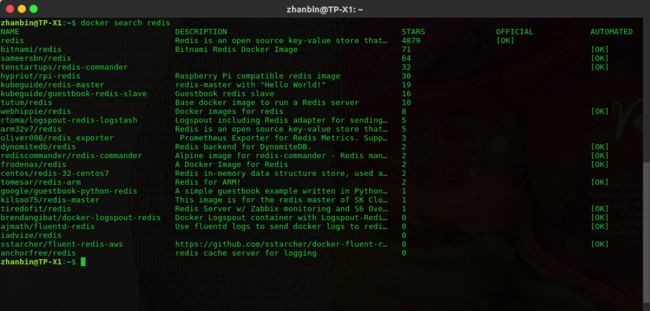前言
会话是临时存储数据信息的一种机制。但是如果项目需要使用一些高复用的服务器架构(如下图),就需要实现session数据同步或者统一存储,不然就有可能出现会话状态丢失的问题。所以如何共享Session信息就是一个需要解决的问题。下面本文讲述的是,如何使用Thinkphp搭配Redis存储Session信息(单应用服务器,单redis版本),以达到Session共享的目的。
环境
- 操作系统 Linux ubuntu 16.04
- PHP环境 PHP 7.0.28-0ubuntu0.16.04.1 ( NTS )
- redis版本 4.0.8
介绍
Redis是一个使用ANSI C编写的开源、支持网络、基于内存、可选持久性的键值对存储数据库。根据月度排行网站DB-Engines.com的数据显示,Redis是最流行的键值对存储数据库
安装Redis
源码包安装
根据redis官网的教程
1, Download, extract and compile Redis with:
wget http://download.redis.io/releases/redis-4.0.8.tar.gz
tar xzf redis-4.0.8.tar.gz
cd redis-4.0.8
make
2, The binaries that are now compiled are available in the src directory. Run Redis with:
src/redis-server
3, You can interact with Redis using the built-in client:
src/redis-cli
redis> set foo bar
OK
redis> get foo
"bar"
一切顺利的话,源码包Redis就安装完毕了。另外我们也可以使用Docker安装Redis。
Docker仓库安装
这里是Redis的仓库 ,提供了 Redis 3.x ~ 4.x 各个版本的镜像。
1, 查看docker-hub上的远程仓库
docker search redis
2, 执行下面命令,大意是首先docker会本地搜索docker images中理出来的镜像,如果没有则从docker hub(国内镜像)拉取redis的docker镜像,然后启动一个名为some-redis容器,-p是把本地的9736端口和容器中的6379端口映射起来,-d (daemon)并让容器运行在后台,--requirepass客户端链接需要认证。
docker run --name my-redis -p 9736:6379 -d redis --requirepass "11110000"
##查看docker已经启动的容器
docker ps
##安装redis客户端
sudo apt install reids-tools
##尝试从外部主机范围docker中的redis
redis-cli -h 127.0.0.1 -p 9736 -a 11110000
Docker仓库安装的程序,拓展迁徙相对简单,和其他系统的耦合性很小。接下来我们安装拓展。
安装php-redis 拓展
拓展我们选择phpredis,这个比较通用,更新比较及时。github地址在这里
git clone https://github.com/phpredis/phpredis.git
##切换到phpredis所在的文件夹
phpize
./configure
make && make install
##重启php服务
systemctl restart php7.0-fpm.service
这时候就可以去phpinfo页面看到redis拓展已经成功出现了。
这时候,我们就可以在php程序中操作redis数据库了。新建一个文件vim phpredis.php,内容如下。
connect('127.0.0.1',9736);
$redis->auth("11110000");
var_dump($redis->info());
##执行上面的测试文件,如果成功了,就出现类似下面的结果。
php phpredis.php
到这,php-redis拓展已经安装成功,我们也可以在php程序总操作redis数据库了。接下来我们就在项目中使用redis存储session。
Redis存储Session
如果是使用原生的php来实现这个功能,就需要调整配置文件php.ini,配置phpredis使用文档编写代码。
session.save_handler = redis
session.save_path = "tcp://host1:6379?weight=1"
如果是使用php框架的话,一般框架已经集成了对应的模块操作驱动。我们可以到thinkphp官网找到Session的Redis存储驱动类。我们需要在相对应的位置(./ThinkPHP/Library/Think/Session/Driver/
)新建一个Redis.class.php文件,内容如下。
C('REDIS_HOST') ? C('REDIS_HOST') : '127.0.0.1',
'port' => C('REDIS_PORT') ? C('REDIS_PORT') : 6379,
'timeout' => C('REDIS_TIMEOUT') ? C('REDIS_TIMEOUT') : false,
'persistent' => C('REDIS_PERSISTENT') ? C('REDIS_PERSISTENT'):false,
'auth' => C('REDIS_AUTH') ? C('REDIS_AUTH') : false,
);
}
$options['host'] = explode(',', $options['host']);
$options['port'] = explode(',', $options['port']);
$options['auth'] = explode(',', $options['auth']);
foreach ($options['host'] as $key=>$value) {
if (!isset($options['port'][$key])) {
$options['port'][$key] = $options['port'][0];
}
if (!isset($options['auth'][$key])) {
$options['auth'][$key] = $options['auth'][0];
}
}
$this->options = $options;
$expire = C('SESSION_EXPIRE');
$this->options['expire'] =
isset($expire) ? (int)$expire : (int)ini_get('session.gc_maxlifetime');
$this->options['prefix'] =
isset($options['prefix']) ? $options['prefix'] : C('SESSION_PREFIX');
$this->handler = new \Redis;
}
/**
* 连接Redis服务端
* @access public
* @param bool $is_master : 是否连接主服务器
*/
public function connect($is_master = true) {
if ($is_master) {
$i = 0;
} else {
$count = count($this->options['host']);
if ($count == 1) {
$i = 0;
} else {
$i = rand(1, $count - 1); //多个从服务器随机选择
}
}
$func = $this->options['persistent'] ? 'pconnect' : 'connect';
try {
if ($this->options['timeout'] === false) {
$result = $this
->handler
->$func($this->options['host'][$i], $this->options['port'][$i]);
if (!$result)
throw new \Think\Exception('Redis Error', 100);
} else {
$result = $this
->handler
->$func($this->options['host'][$i], $this->options['port'][$i],
$this->options['timeout']);
if (!$result)
throw new \Think\Exception('Redis Error', 101);
}
if ($this->options['auth'][$i]) {
$result = $this->handler->auth($this->options['auth'][$i]);
if (!$result) {
throw new \Think\Exception('Redis Error', 102);
}
}
} catch ( \Exception $e ) {
exit('Error:'.$e->getMessage().'
Error Code:'.$e->getCode().'');
}
}
/**
+----------------------------------------------------------
* 打开Session
+----------------------------------------------------------
* @access public
+----------------------------------------------------------
* @param string $savePath
* @param mixed $sessName
+----------------------------------------------------------
*/
public function open($savePath, $sessName) {
return true;
}
/**
+----------------------------------------------------------
* 关闭Session
+----------------------------------------------------------
* @access public
+----------------------------------------------------------
*/
public function close() {
if ($this->options['persistent'] == 'pconnect') {
$this->handler->close();
}
return true;
}
/**
+----------------------------------------------------------
* 读取Session
+----------------------------------------------------------
* @access public
+----------------------------------------------------------
* @param string $sessID
+----------------------------------------------------------
*/
public function read($sessID) {
$this->connect(0);
$this->get_result = $this->handler->get($this->options['prefix'].$sessID);
//延长有效期
$this->handler->expire($this->options['prefix']
.$sessID,C('SESSION_EXPIRE'));
return $this->get_result;
}
/**
+----------------------------------------------------------
* 写入Session
+----------------------------------------------------------
* @access public
+----------------------------------------------------------
* @param string $sessID
* @param String $sessData
+----------------------------------------------------------
*/
public function write($sessID, $sessData) {
if (!$sessData || $sessData == $this->get_result) {
return true;
}
$this->connect(1);
$expire = $this->options['expire'];
$sessID = $this->options['prefix'].$sessID;
if(is_int($expire) && $expire > 0) {
$result = $this->handler->setex($sessID, $expire, $sessData);
$re = $result ? 'true' : 'false';
}else{
$result = $this->handler->set($sessID, $sessData);
$re = $result ? 'true' : 'false';
}
return $result;
}
/**
+----------------------------------------------------------
* 删除Session
+----------------------------------------------------------
* @access public
+----------------------------------------------------------
* @param string $sessID
+----------------------------------------------------------
*/
public function destroy($sessID) {
$this->connect(1);
return $this->handler->delete($this->options['prefix'].$sessID);
}
/**
+----------------------------------------------------------
* Session 垃圾回收
+----------------------------------------------------------
* @access public
+----------------------------------------------------------
* @param string $sessMaxLifeTime
+----------------------------------------------------------
*/
public function gc($sessMaxLifeTime) {
return true;
}
/**
+----------------------------------------------------------
* 打开Session
+----------------------------------------------------------
* @access public
+----------------------------------------------------------
* @param string $savePath
* @param mixed $sessName
+----------------------------------------------------------
*/
public function execute() {
session_set_save_handler(
array(&$this, "open"),
array(&$this, "close"),
array(&$this, "read"),
array(&$this, "write"),
array(&$this, "destroy"),
array(&$this, "gc")
);
}
public function __destruct() {
if ($this->options['persistent'] == 'pconnect') {
$this->handler->close();
}
session_write_close();
}
}
接着在配置文件中配置如下配置项,不需要改动php.ini配置项了。
//SESSION 配置
'SESSION_AUTO_START' => true, //是否开启session
'SESSION_TYPE' => 'Redis', //session 驱动
'SESSION_PREFIX' => '', //session前缀
'SESSION_EXPIRE' => '7200', //session有效期(单位:秒) 0表示永久缓存。
//Redis 配置
'REDIS_HOST' =>'127.0.0.1', //redis服务器ip,多台用逗号隔开;
'REDIS_PORT' =>'9736',//端口号
'REDIS_TIMEOUT' =>'30',//超时时间(秒)
'REDIS_PERSISTENT' =>false,//是否长连接 false=短连接
'REDIS_AUTH' =>'11110000',//AUTH认证密码
其他层面的代码不需要改动,因为框架已经将Session类的操作方面封装起来了。业务存储Session时候,底层会根据配置项来实例化对应的存储驱动类。从而就实现了session存储在对应的redis数据库中了。
如无意外,至此,我们就完成了这次的小目标了。
结语
本文简单地实现了单机版的Redis存储php程序的Session数据。下一步,计划利用Docker技术搭建Redis基础的高可用分布式集群,就本文的基础上进行项目架构拓展。如有兴趣,敬请关注!



